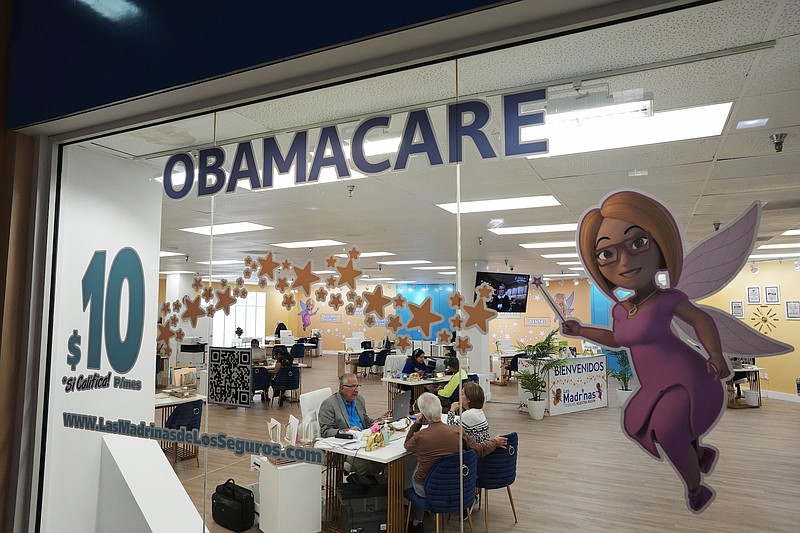We've just passed the 14th anniversary of the enactment of the Patient Protection and Affordable Care Act, aka the Affordable Care Act, aka Obamacare — although many of the law's provisions didn't take effect until 2014.
In its early years, Obamacare was the subject of fierce criticism from both the left and the right. Actually, politicians on the right are still saying the same things they said a decade ago. But Obamacare has survived, greatly expanding health insurance coverage without busting the budget. Critics on the left complain that it hasn't produced truly universal health care, which indeed it hasn't. But it has done a lot and has become quite popular.
So why has Obamacare worked as well as it has?
The thing is, critiques of Obamacare from the left have a point. If your goal is to give people access to health care, why not just give them access, by instituting a single-payer system in which the government pays the bills? This was, in fact, what we did for seniors when Medicare was created in the 1960s.
The ACA, however, created a complicated system in which people have to buy their own insurance, although in many cases the government picks up much of the tab. And the complexity of the system, combined with the fact that important parts of it are run by state governments, some of which are controlled by conservatives who want Obamacare to fail, means that a lot of people fall through the cracks: 8% of the U.S. population is still uninsured, although that's a lot better than the pre-ACA situation.
Why, then, didn't we go for single-payer? Politics. It wasn't just a matter of buying off the insurance industry by keeping it at the center of American health care, although that was part of it. More important, I believe, was the perceived need to avoid disturbing Americans happy with their existing health coverage, mostly those getting insurance via their employers. Obamacare sought to fill the holes in our system by adding new stuff. In particular, it tried to create a working marketplace in which individuals not covered by their employers could find affordable health insurance.
Many people, especially but not only on the right, expected this effort to fail. Yet Obamacare didn't collapse. Why not?
Here's how I'd put it: In practice, Obamacare has ended up functioning a lot like a single-payer system after all.
First, a large part of the rise in health coverage came from an expansion of Medicaid, the government health insurance for lower-income Americans — single-payer, although less generous than Medicare.
Second, individual purchase of insurance on the ACA-created marketplaces is subsidized. In fact, last year 91% of marketplace enrollees were receiving so-called premium tax credits. In many cases these credits cover a large part of an individual's premium. Also, crucially, the subsidies don't take the form of lump-sum credits. Instead, the law specifies a maximum percentage of income that enrollees can pay for insurance (that percentage itself depends on your income) and makes up the difference if premiums exceed that maximum.
This isn't single-payer, exactly, but it does mean that the government is the marginal payer, in the sense that even if premiums rise, most people don't pay more — the government picks up the extra bills. This means even if healthy people drop their insurance, costs for most enrollees don't rise.
This is smart policy design; among other things it protects the ACA from hostile politicians. Soon after taking office in 2017, Donald Trump declared that "the best thing politically is to let Obamacare explode." And while his attempt to repeal the law failed, his administration engaged in acts of sabotage. But the subsidies frustrated this plan.
Obamacare, then, has defied the doomsayers. But what about warnings that it would prove unsustainably costly? Federal spending on health care is currently considerably lower than the Congressional Budget Office projected before the ACA went into effect, despite the expansion of coverage. How was this possible?
Part of the answer is that before Obamacare went into effect, the uninsured in America consisted disproportionately of relatively young adults — and the health costs of younger people are, on average, much lower than those of seniors (who were already covered by Medicare). So covering many of the uninsured was never going to cost all that much, unless the policy design was fatally flawed, which it wasn't.
Beyond that, the enactment of the ACA coincided with a sustained slowdown in the growth of overall health care spending.
In any case, Obamacare has worked. It didn't provide universal coverage, but it did provide health insurance to millions of Americans, some of whom desperately needed that safety net — and it did so without breaking the bank. Predictions that the ACA would be unworkable have been proved wrong. At this point, the only serious threat the program faces — and it is a serious threat — is political: People who kept insisting, wrongly, that health reform would die of its own accord may simply step in to kill it.
